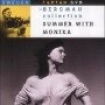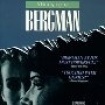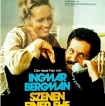Riten
| 片名: | Riten |
|---|---|
| 其它片名: | /The Ritual |
| 导演: | Ingmar Bergman |
| 编剧: | Ingmar Bergman |
| 制片人: | Lars-Owe Carlberg |
| 摄影: | Sven Nykvist |
| 美术: | Karl-Arne Bergman |
| 声音: | Olle Jacobsson, Lennart Engholm, Berndt Frithiof |
| 剪辑: | Siv Lundgren |
| 主演: | Gunnar Björnstrand, Ingrid Thulin, Anders Ek |
| 片长: | 72分钟 |
| 年份: | 1967年 |
| 类型: | |
| 国别: | 瑞典 |
| 语言: | 瑞典语 |
| 格式: | |
| 制作机构: | Svensk Filmindustri (SF) |
影片概述 . . . . . .
This is a somewhat odd and enigmatic film from Bergman; perhaps in keeping with many of the other films that he produced during the mid-to-late 1960's, and one that seems to be an extension of the artistic and psychological themes established in his more widely-acknowledged masterpiece, Persona (1966). Like that particular film, The Rite (1969) is a carefully structured drama built around a small cast of characters warring with one another in a close and claustrophobic environment that stresses the theatrical nature of the script. By refusing to extend on the material as many other filmmakers would when adapting one of their own works from stage to screen, Bergman creates a much tighter situation that gives the drama a stark, nightmarish quality that removes us completely from reality. Here, we are isolated with these characters, with all notion of the outside world or life beyond those drab, grey, minimalist locations having been removed completely, creating a void that overwhelms us.
The film also extends on some of the director's more recognisable themes, such as performance and persecution, with the idea of actors playing actors creating a performance that is not simply a part of the film, but also a comment upon it. It's perhaps a little clumsy in some places, especially compared to the aforementioned Persona, or indeed, similarly themed films like Hour of the Wolf (1966) and A Passion (1968); with the deeply enigmatic nature and theatrical presentation working towards an incredibly cold and uncomfortable atmosphere that never quite explains itself. I suppose this is a result of the short-running time and the fact that it was produced quickly and cheaply for Swedish television. However, it is still an incredibly bold piece of work, and one that definitely needs to be experienced by those with a real taste and admiration for the filmmaker; with the typically "Bergmanesque" themes and the strong performances and intense and troubling characterisations created by the cast making this a much more interesting and rewarding film than the brief plot outline might suggest.
The structure of the film is intended to somewhat distance us from the drama in a way that many of Bergman's better films would. Here, he uses chapter headings to disrupt the narrative; bringing to our attention the theatrical nature of the presentation and the artificiality of the world to, in effect, remove us from it. It works on a similar level to the self-reflexive interview sequences that punctuate the narrative of the previous A Passion, albeit, on a much more subtle level. Again, it is intended to add a further dimension to the film, but also to make the viewing process even more difficult. It also denies us a central character, with both the central government figure and the three performers all moving from hateful to sympathetic from one scene to the next. There are also at least two scenes that seem to be even further disconnected from reality. One such scene involves the youngest of the performers setting fire to his hotel room, lying back on his bed with his sunglasses on and staring up at the ceiling with a cool detachment as the room is engulfed by flames. It is never referred to or explained whether this scene actually takes place or if it is merely symbolic; though I suppose it could be read on an analytical level in regards to that particular character and his somewhat damaged and detached personality.
The second scene I won't go into, as it's one of the most important moments in the film. However, it is interesting how it sets up the atmosphere for that troubling and enigmatic finale, which again, is never fully explained and seems to sway the film away from the performers and more towards the self-appointed judge. There's a definite Kafka-like influence developed here, not only with the characters but with the situation that they find themselves in. So, we have a small group of characters put on trial for what we later learn are "obscenity charges", but the actual scenes between the judge and the performers seems to be much more cryptic and personal. If you're fond of the mind games and psychological role-playing developed in Persona then you should get a real thrill out of the five interview scenes that form the backbone of the film in question, with each character playing up to their own emotional strengths and weaknesses whilst finding themselves in this hopeless and incomprehensible situation.
Given the nature of the film I won't discuss the ending too much, though suffice to say it changes the way we look at those preceding scenes and seems to open up the narrative to further ideas of self-reflexive interpretation. So, we have the idea of a film within a film, or perhaps something more literal. Or is it a metaphor for the struggle of creativity in the face of government oppression. Indeed, at the time this film was made, Bergman was fighting his own battles against both theatre and cinema and how they were being developed back in Sweden at this particular time. It seems like he had lost faith in his audience and those who were paying for his work to be developed and these fears and anxieties are presented in the film alongside a rage of fury and aggression. For certain, this is a dark, troubling and enigmatic psychological piece that rewards patient viewers with a thought-provoking, Kafkaesque moral dilemma with room for personal interpretation.
阿伯拉汉森法官因怀疑对西亚、塞巴斯蒂安、汉斯。文克曼进行审查,这三个艺术家有着怪异的生活习惯,他们之间的关系也与众不同,由于审查触怒了他们的自尊,他们就决定报复,他们用一种古老的仪式,让呵伯拉汉森死于心脏病中……
The film also extends on some of the director's more recognisable themes, such as performance and persecution, with the idea of actors playing actors creating a performance that is not simply a part of the film, but also a comment upon it. It's perhaps a little clumsy in some places, especially compared to the aforementioned Persona, or indeed, similarly themed films like Hour of the Wolf (1966) and A Passion (1968); with the deeply enigmatic nature and theatrical presentation working towards an incredibly cold and uncomfortable atmosphere that never quite explains itself. I suppose this is a result of the short-running time and the fact that it was produced quickly and cheaply for Swedish television. However, it is still an incredibly bold piece of work, and one that definitely needs to be experienced by those with a real taste and admiration for the filmmaker; with the typically "Bergmanesque" themes and the strong performances and intense and troubling characterisations created by the cast making this a much more interesting and rewarding film than the brief plot outline might suggest.
The structure of the film is intended to somewhat distance us from the drama in a way that many of Bergman's better films would. Here, he uses chapter headings to disrupt the narrative; bringing to our attention the theatrical nature of the presentation and the artificiality of the world to, in effect, remove us from it. It works on a similar level to the self-reflexive interview sequences that punctuate the narrative of the previous A Passion, albeit, on a much more subtle level. Again, it is intended to add a further dimension to the film, but also to make the viewing process even more difficult. It also denies us a central character, with both the central government figure and the three performers all moving from hateful to sympathetic from one scene to the next. There are also at least two scenes that seem to be even further disconnected from reality. One such scene involves the youngest of the performers setting fire to his hotel room, lying back on his bed with his sunglasses on and staring up at the ceiling with a cool detachment as the room is engulfed by flames. It is never referred to or explained whether this scene actually takes place or if it is merely symbolic; though I suppose it could be read on an analytical level in regards to that particular character and his somewhat damaged and detached personality.
The second scene I won't go into, as it's one of the most important moments in the film. However, it is interesting how it sets up the atmosphere for that troubling and enigmatic finale, which again, is never fully explained and seems to sway the film away from the performers and more towards the self-appointed judge. There's a definite Kafka-like influence developed here, not only with the characters but with the situation that they find themselves in. So, we have a small group of characters put on trial for what we later learn are "obscenity charges", but the actual scenes between the judge and the performers seems to be much more cryptic and personal. If you're fond of the mind games and psychological role-playing developed in Persona then you should get a real thrill out of the five interview scenes that form the backbone of the film in question, with each character playing up to their own emotional strengths and weaknesses whilst finding themselves in this hopeless and incomprehensible situation.
Given the nature of the film I won't discuss the ending too much, though suffice to say it changes the way we look at those preceding scenes and seems to open up the narrative to further ideas of self-reflexive interpretation. So, we have the idea of a film within a film, or perhaps something more literal. Or is it a metaphor for the struggle of creativity in the face of government oppression. Indeed, at the time this film was made, Bergman was fighting his own battles against both theatre and cinema and how they were being developed back in Sweden at this particular time. It seems like he had lost faith in his audience and those who were paying for his work to be developed and these fears and anxieties are presented in the film alongside a rage of fury and aggression. For certain, this is a dark, troubling and enigmatic psychological piece that rewards patient viewers with a thought-provoking, Kafkaesque moral dilemma with room for personal interpretation.
阿伯拉汉森法官因怀疑对西亚、塞巴斯蒂安、汉斯。文克曼进行审查,这三个艺术家有着怪异的生活习惯,他们之间的关系也与众不同,由于审查触怒了他们的自尊,他们就决定报复,他们用一种古老的仪式,让呵伯拉汉森死于心脏病中……
导演阐述 . . . . . .
获得奖项 . . . . . .
评论列表(0) . . . . . . ( 发表新评论 ) ( 更多评论 )
幕后花絮 . . . . . . (上传花絮) (展开所有)
伯格曼的一部电视电影。电影带有强烈的象征意义,明显是要通过艺术家与法官的纠缠来象征艺术语言的创作和更新必须与压制艺术的黑暗势力和专制制度进行决裂和争斗,但新的艺术方式的诞生又必须熬过阵痛期。电影十分晦涩难懂,不容易被人接受。
——2009-04-17 17:42:38,4444上传
——2009-04-17 17:42:38,4444上传
影片图集 . . . . . . (更多/我要上传)
相关视频 . . . . . . (更多/我要分享)
对本影片资料作出贡献的会员 . . . . . .
4444(创建者)





























































